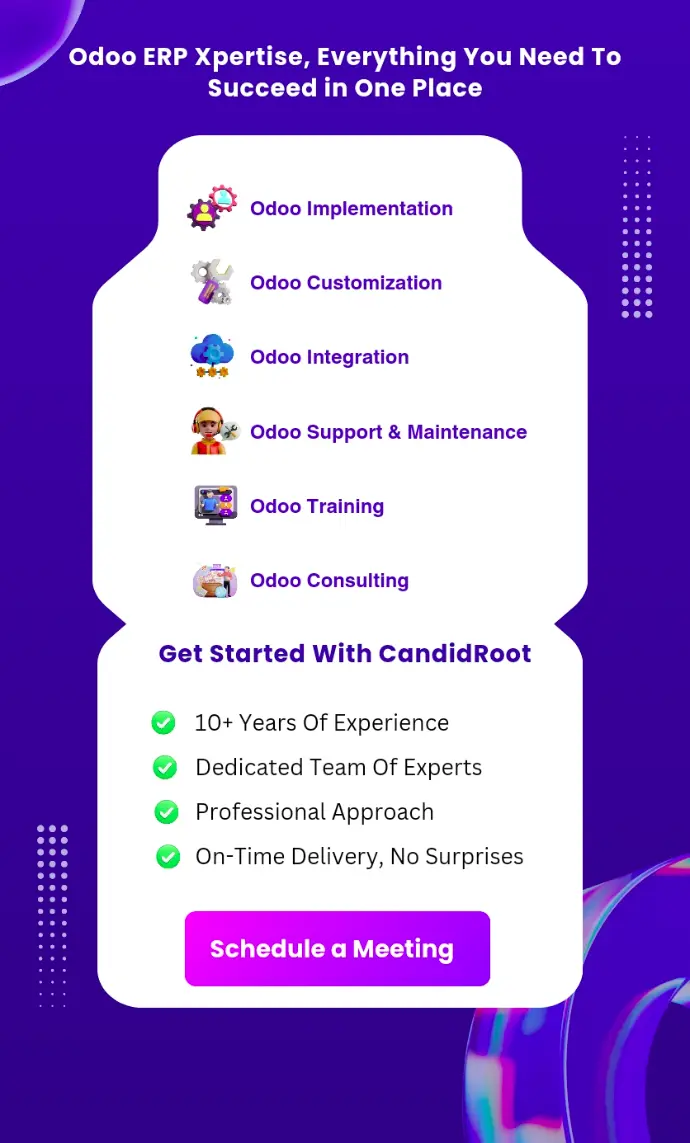Why Measure Odoo ERP Performance?
Before delving into how to measure Odoo ERP performance, let's understand why it's essential. An ERP system like Odoo encompasses various modules, from inventory management to human resources and finance. These modules are interrelated and affect multiple aspects of your business, making it crucial to evaluate their performance regularly.
Measuring Odoo ERP performance serves several purposes:
1. Identifying Bottlenecks: Performance metrics can help pinpoint bottlenecks and areas of improvement within your ERP system. This enables you to optimize processes and ensure that your operations run smoothly.
2. Cost Optimization: By measuring performance, you can identify resource-intensive processes and find ways to optimize them, leading to cost savings.
3. User Satisfaction: Ensuring that Odoo functions efficiently is essential for user satisfaction. Employees are more likely to embrace and effectively use the system if it performs well.
4. Strategic Decision-Making: Accurate performance data enables informed decision-making. You can allocate resources strategically, plan for upgrades, and make changes to align the ERP system with your business goals.
Key Performance Metrics for Odoo ERP
Now that we understand why measuring Odoo ERP performance is crucial, let's explore some key performance metrics you should consider:
1. Response Time: This metric measures how quickly Odoo responds to user actions. User annoyance can be caused by slow response times. Monitor response times for different modules and functions to identify areas that need optimization.
2. Uptime and Availability: Ensure that Odoo is available when needed. Downtime can disrupt operations and lead to financial losses. Aim for high uptime percentages and quick recovery in case of failures.
3. Transaction Throughput: Track the number of transactions processed by Odoo per unit of time. This metric helps gauge system capacity and scalability. As your business grows, you'll want Odoo to handle more transactions without a drop in performance.
4. Error Rates: Keep an eye on error rates within Odoo. High error rates can lead to data inaccuracies and operational issues. Monitoring errors helps you identify and address underlying issues.
5. Database Performance: Odoo relies heavily on its database. Measure database performance, including query response times and data retrieval speed. Optimize the database structure and indexing for improved performance.
6. Resource Utilization: Monitor CPU, memory, and storage utilization on the servers hosting Odoo. High resource consumption may indicate the need for hardware upgrades or better resource allocation.
7. User Adoption and Engagement: Assess user engagement with Odoo by tracking user logins, feature usage, and adoption rates. Encourage users to leave feedback so that we can find areas that need work.
8. Integration Performance: If you have integrated Odoo with other systems, monitor the performance of these integrations. Ensure data flows smoothly between Odoo and external applications.
Read More: Explore Odoo ERP for Auto Manufacturers
Tools for Measuring Odoo ERP Performance
To measure Odoo ERP performance effectively, you'll need the right tools. Here are some commonly used tools and approaches:
1. Profiling Tools: Odoo provides built-in profiling tools that help analyze code performance. Use these tools to identify bottlenecks in your customizations.
2. Monitoring and Alerting Systems: Implement monitoring and alerting systems like Nagios, Zabbix, or Prometheus to continuously track the health and performance of Odoo instances.
3. Load Testing Tools: Conduct load testing using tools like Apache JMeter or Locust to simulate high user loads and identify performance limitations.
4. Database Profiling: Use database profiling tools to analyze and optimize the database queries generated by Odoo. Tools like pg_stat_statements in PostgreSQL can be valuable.
5. User Feedback: Don't underestimate the power of user feedback. Encourage users to report performance issues and provide feedback on their experiences with Odoo.
Continuous Improvement and ROI Maximization
Measuring Odoo ERP performance is not a one-time task but an ongoing process. As your business evolves, so do your ERP system's demands and challenges. Regularly review performance metrics and make necessary improvements to maximize your ROI. Best practises to adhere to are listed below:
1. Stay Informed: Keep up with the latest Odoo updates and patches. Bug fixes and performance improvements are frequently included in new versions.
2. Regular Maintenance: Perform routine maintenance tasks, such as database vacuuming, data archiving, and code optimization, to keep Odoo running smoothly.
3. Scale Smartly: If your business experiences growth, ensure that your Odoo infrastructure scales accordingly. Consider horizontal and vertical scaling options to accommodate increased workloads.
4. Employee Training: Invest in training for your employees to ensure they are using Odoo efficiently. Well-trained users are more likely to leverage the system's capabilities effectively.
5. Consult Experts: When in doubt, consult Odoo experts or partners who can provide guidance on performance optimization and best practices.
Conclusion
Odoo ERP can be a powerful tool for your business, but its performance plays a crucial role in realizing its full potential and maximizing ROI. By measuring key performance metrics, using the right tools, and adopting a continuous improvement mindset, you can ensure that Odoo remains an asset that drives efficiency and growth for your organization.


